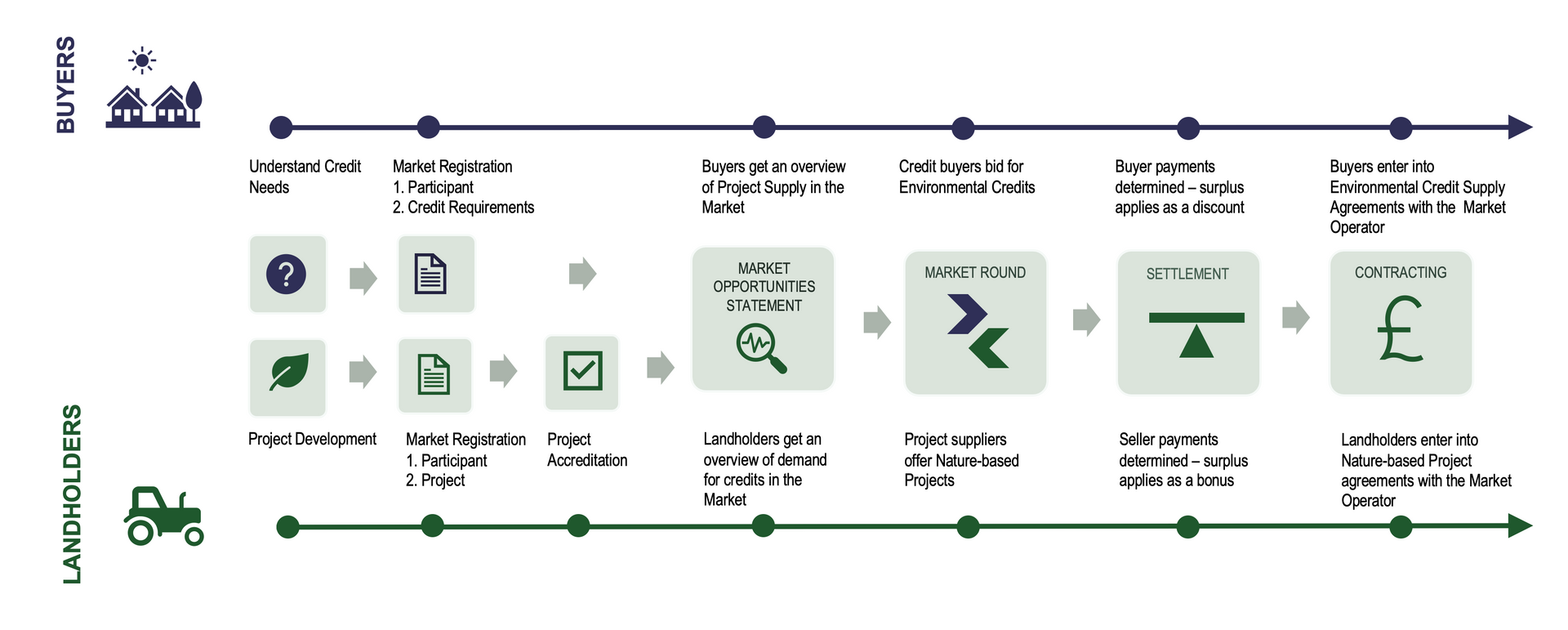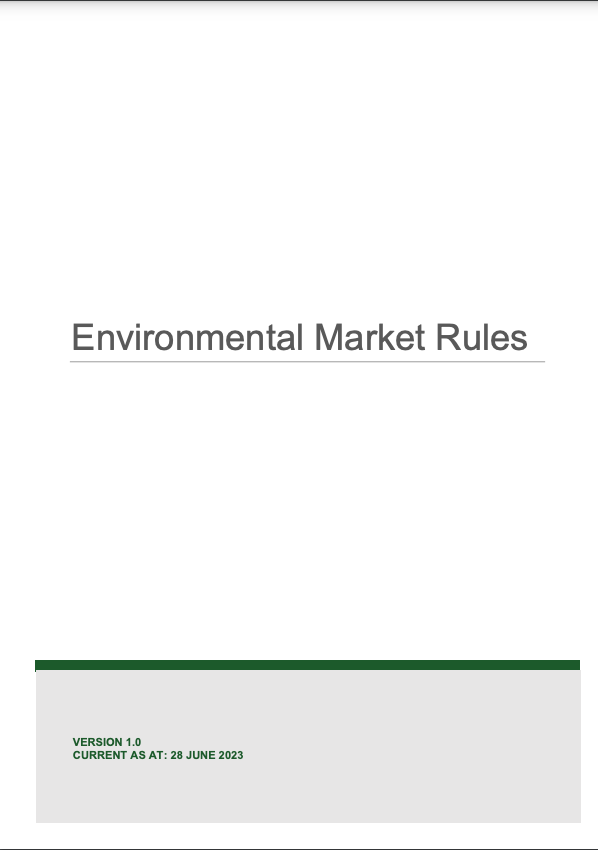Market Overview
The Somerset Catchment Market is an environmental services market that aims to accelerate the delivery of Nature-based Projects such as the creation of new woodlands and wetlands to reduce Phosphate pollution.
Market Governance
The operation of the Somerset Catchment Market is overseen by the Environmental Markets Board.
The Board:
- ensures that there is a transparent, fair and efficient set of Market Rules in place
- appoints a Market Operator to run the Market, and monitors and enforces their compliance with the Market Rules
- ensures that Market Operators maintain the market infrastructures, systems and processes necessary to ensure genuine, lasting and additional environmental improvements, which are robustly verified and transparently documented.
Market Rules
The purpose of the Market Rules is to provide a transparent, fair and efficient governance framework for the operation of Environmental Markets.
The Market Rules ensure that Market Participants understand their rights and responsibilities and provide a robust and reliable mechanism to facilitate the supply of Nature-based Projects and trading the Environmental Services generated by these Projects.
Market Operator
EnTrade
EnTrade creates and operates high-integrity online markets for nature that deliver cleaner water, increased biodiversity, reduced greenhouse gas emissions and natural flood management. EnTrade is the Market Operator for the Somerset Catchment Market.
Market process
The diagram below highlights the market process for businesses interested in buying Environmental Credits and landholders interested in supplying Nature-based Projects to the market.

Landholder participation
The Somerset Catchment Market is looking for nature recovery projects, such as the creation of interceptor woodlands, wetlands and arable reversion. Details about each stage of the Market Process for landholders is summarised below.

Project Development
The first step for landholders and farmers is to express their interest in developing Nature-based Projects that can provide habitat for wildlife and deliver other environmental services such as nutrient mitigation and carbon sequestration.
If you are interested in participating in supplying projects to the market please contact the Somerset Catchment Market team directly.

Participant and Project Registration
To participate in the market, landholders (or their agents) must register as a Market Participant.
Landholders (or their agents) need to register their proposed Nature-based Project, providing the information needed to be accredited for the environmental services it will deliver. By registering a Project, a landholder is making a commitment to make an offer in the Market.

Project Accreditation
The Market Operator accredits the Environmental Services delivered by the Projects in accordance with approved standards.

Market Opportunities Statement
Before each Market Round, a Market Opportunities Statement will be released which provides an overview of the demand for environmental services and the opportunities for landholders to supply projects.

Market Round
In the Market Round landholders that have Registered a Project for sale in a Market Round must make a Project Offer.
A Project Offer needs to cover:
- the use of the Project Land for the term of the Landholder Agreement:
- the cost of designing and delivering the Project to the Project Specification (including securing relevant consents);
- the cost of maintaining the Project in accordance with the Management Plan;
- the cost of the compliance reporting required.

Settlement
The market settlement mechanism has been designed by the Land, Environment, Economics and Policy Institute at the University of Exeter. The process, known as the Lindsay Mechanism, ensures payments are fair both for project suppliers and businesses buying environmental credits.
Surplus from trades is allocated fairly between suppliers (a bonus on their offer) and buyers (a discount on their bid).

Contracting and Delivery
If successful in the market, landholders will enter into a Nature-based Project Agreement with the Market Operator to deliver the project and maintain it to the required standard.
A payment schedule will be agreed, and regular monitoring will make sure projects are delivering the expected environmental outcomes.
Credit buyer participation
The Somerset Catchment Market makes it easier for organisations to meet their environmental goals.
Organisations with voluntary commitments or regulatory obligations such as Nutrient Neutrality, Biodiversity Net Gain, Net Zero Carbon emissions and other environmental commitments can purchase Environmental Credits from verified projects that can be used to demonstrate delivery on these commitments.
The process for businesses interested in buying Environmental Credits from the market is summarised below.

Understand Credit needs
Businesses can express their interest in purchasing Environmental Credits (type and quantity) through the EOI process.

Environmental Credit Requirement Registration
To participate in the Market, buyers (or their agents) need to:
- register as a Market Participant
- register the type and quantity of Environmental Credits that they require.

Market Opportunities Statement
Before each Market Round, a Final Market Opportunities Statement will be released which provides an overview of the demand for environmental services and the opportunities for landholders to supply projects.

Market round
When the Market Round opens, buyers enter bids for the quantity and price for each type of environmental credit that they need into the Market Platform.

Settlement
The market settlement mechanism has been designed by the Land, Environment, Economics and Policy Institute at the University of Exeter. The process, known as the Lindsay Mechanism, ensures payments are fair both for project suppliers and businesses buying environmental credits.
Surplus from trades is allocated fairly between suppliers (a bonus on their offer) and buyers (a discount on their bid).

Contracting and Delivery
Successful bidders will enter into an Environmental Credit Supply Agreement with the Market Operator and receive the credits purchased.
Ensuring market integrity
All market participants must comply with competition law and avoid anti-competitive behaviour.
Examples of anti-competitive behaviour include:
- Setting offer prices for Nature-based Projects in consultation with other landholders
- Setting bid prices for Environmental Credits in consultation with other businesses
- Coordinating with other market participants about participating in Market Rounds (eg taking it in turns to participate)
To ensure market integrity, the Market Operator will report any suspicious activity to the Competition and Markets Authority.
If you have any questions, please do not hesitate to contact the Somerset Catchment Market Pilot Team.
Glossary of key terms
Catchment Market
A Catchment Market is an on-line marketplace where Nature-based Projects can be sold, and credits for the Environmental Services delivered by these Projects can be bought.
Nature-based Project
Nature-based Projects are habitat creation, restoration or improvement projects that deliver Environmental Services. Examples of Nature-based Projects include creating wetlands, planting new woodlands, and reversion of arable farmland to grassland.
Environmental Services
Environmental Services include biodiversity and water quality improvements, natural flood management, carbon sequestration and other outcomes delivered by Nature-based Projects.
Environmental Credits
Environmental Credits are a form of intangible property that represent the Environmental Services delivered by a Nature-based Project.
Market Operator
The Market Operator (MO) is the organisation that establishes and operates the Catchment Market. EnTrade is the Market Operator for the Somerset Catchment Market.
The Market Operator:
- Calls for Expressions of Interest in supplying projects and buying credits
- Reviews Project proposals and estimates the Environmental Credits that will be delivered
- Registers Projects that meet the required Project Specifications for sale in the Market
- Accredits Projects for the Environmental Services that will be delivered.
- Registers the Credit Requirements of Credit Buyers
- Manages the market bidding and settlement processes
- Enters into Environmental Credit Supply Agreements with Credit Buyers, and Nature-based Project Agreements with landholders


